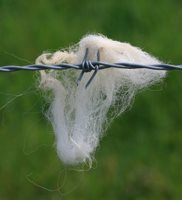
Top stories



ESG & SustainabilityRedisa calls on govt to fix South Africa’s “broken” waste management system
2 hours


HR & Management#TopEmployers2026: Nolo Thobejane on why people power KFC’s purpose
Shan Radcliffe 3 hours

More news











Crushing restrictions
The battle was sparked by China's ruling that it would not accept wool from sheep farmed in areas where RVF had tested positive, association national chairman Leon de Beer said Wednesday, 19 May 2010.
"The situation is serious. More than 60% of our clip goes to China. And about 40% of the bales we auction presently come from farms in confirmed RVF areas."
The state vet said this week that farms in Cradock, Humansdorp, Middelburg, Hofmeyr, Steynsburg, Jansenville, Graaff-Reinet and Tsitsikamma had tested positive for RVF.
De Beer said China's ruling was unacceptable because RVF could not be spread through the export of hides or wool.
"This fact is specifically noted in the EU's world organisation for animal health legislation - and China is signatory to this legislation.
"So we are trying through all agricultural, trade and diplomatic channels to get them to withdraw their ruling."
The association's officials initiated a special meeting in France two weeks ago during the annual meeting of the International Wool and Textile Organisation, but no progress was made, he said.
While negotiations are going on, the association has mounted a countrywide awareness programme to educate its members about the disease and the best way to combat it.
The fever is spread by mosquitos, so flocks grazing alongside rivers or dams are most vulnerable.
However, it is hoped that as winter sets in and mosquito activity quietens down, the disease will retreat.
The only way a farmer could ensure RVF did not infiltrate his flock was to vaccinate, De Beer said.
"This disease only comes around once every 20 years or so, so some farmers do not vaccinate. When it does hit, there is an over-demand for the vaccine and an initial shortage, which is what happened this time."
Onderstepoort veterinary institute was working hard to generate more vaccines and the shortage should shortly be overcome. But an added problem was that live vaccines could not be administered to pregnant animals, he said. "So the only way to properly combat RVF is to plan ahead and vaccinate your animals every year even when there is no RVF around."
Andre Strydom, general manager of Cape Wools, which is also based in Port Elizabeth, said it was not yet clear how many sheep and mohair farming areas had been hit by the disease.
"It is also not possible to say how badly Eastern Cape wool growers are affected by the China situation because the exporters make up their own consignments. But the national wool export industry is worth in excess of R800-million a year.
"I am confident the situation with China can be solved positively, and as winter approaches the disease will retreat."
Agri Eastern Cape president Kerneels Pietersen said the figure from the state vet this week - that 45 Eastern Cape farms had now tested positive for RVF - was correct.
"The losses so far have been substantial, millions of rands in terms of individual animals lost but then also of gene pools and breeding materials destroyed through the loss of a prize ram or bull or breeding stock. It can take years to build up these gene pools and they are vital to the success of a farm."
Agri Eastern Cape was calling on farmers to work closely with their state vets and to report any suspicion that RVF had hit their farm, he said.
Pietersen said the worst-hit area was around Gariep Dam and Venterstad in the Ukhuhlamba District Municipality. "This is one of the few district municipalities across the province that are not drought-stricken."
Although the fever primarily strikes domestic farm animals, there are records of game dying as well. Dr William Fowlds, a wildlife vet and chairman of the Eastern Cape western region private nature reserve forum Indalo, said no game mortalities had been reported to him but Indalo was consulting with Onderstepoort and would shortly be issuing a letter of advice to members.
The perception was that the disease would die back with the onset of winter and frost but this might not be the case, he said.
"It depends on what kind of a winter we have."
SANParks vet Dr David Zimmerman said no stock had been lost in the Eastern Cape or Tsitsikamma national parks.
"My perception is that there is a general increase in vector-born disease affecting everything from horses to penguins. My view is climate change is definitely playing a role," he said.
Climate change specialists have warned regularly over the past decade that it could bring seriously damaging changes in vector-born diseases.
Source: The Herald

For more than two decades, I-Net Bridge has been one of South Africa’s preferred electronic providers of innovative solutions, data of the highest calibre, reliable platforms and excellent supporting systems. Our products include workstations, web applications and data feeds packaged with in-depth news and powerful analytical tools empowering clients to make meaningful decisions.
We pride ourselves on our wide variety of in-house skills, encompassing multiple platforms and applications. These skills enable us to not only function as a first class facility, but also design, implement and support all our client needs at a level that confirms I-Net Bridge a leader in its field.
Go to: http://www.inet.co.za